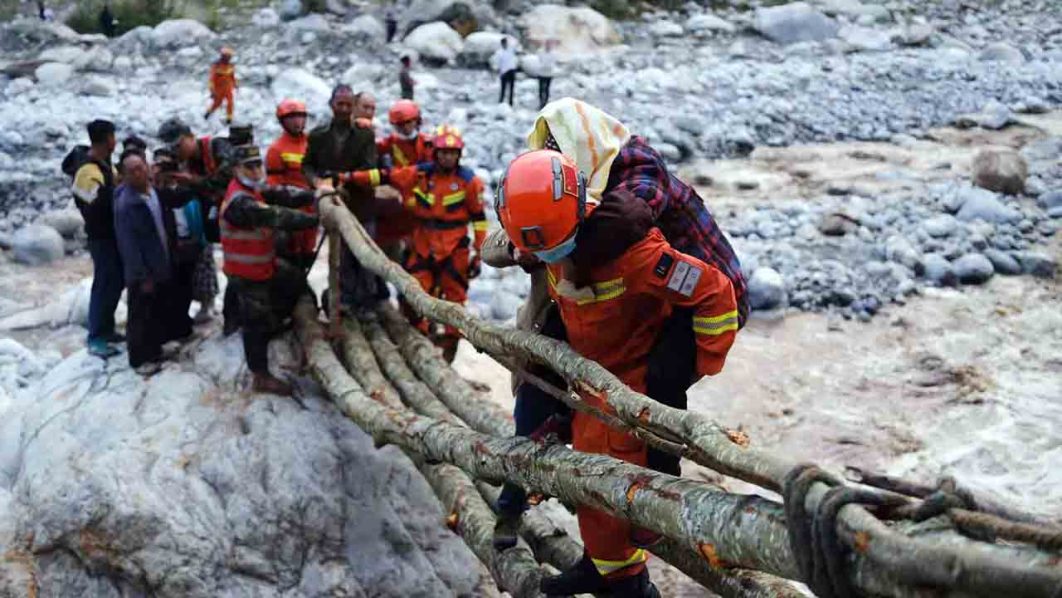Rescuers comb for survivors after dozens gets killed in China quake.
By Admin
This photo taken on September 5, 2022 shows rescue workers evacuating residents after a 6.6-magnitude earthquake in Luding county, Ganzi, in China’s southwestern Sichuan province.
Rescuers scoured through the rubble of remote villages in mountainous southwestern China Tuesday in a race to find survivors of an earthquake that claimed at least 65 lives, with hundreds of people believed stranded or missing.
The magnitude 6.6 quake hit about 43 kilometres (26 miles) southeast of the city of Kangding in Sichuan province at a depth of 10 kilometres on Monday, according to the US Geological Survey.
At least 65 people were killed, state media reported Tuesday morning, with more than 200 still cut off from rescuers in a remote scenic area and scores missing elsewhere.
Video from state broadcaster CCTV showed firefighters pulling a bruised and bloodied woman from the rubble and carrying a survivor on a stretcher across a river on a makeshift bridge as well as damaged buildings and streets strewn with fallen masonry.
Read Also:Twitter is finally rolling out an “Edit Button” — Here’s how it works.
The China Meteorological Administration warned that quake-stricken areas will experience “significant rainfall” until Thursday and that landslides could hamper rescue work.
Footage shared by the China Earthquake Networks Center (CENC) on Monday showed boulders thundering down mountainsides in Luding county, kicking up clouds of dust as the tremors swayed roadside telephone wires.
At least one town suffered “severe damage” from landslides triggered by the quake, CCTV reported.
“Before 5 o’clock, I heard a rumbling sound. The house shook so badly that I woke up immediately,” one woman surnamed Zheng from Sichuan’s Lu county told Beijing News.
“My brother’s house collapsed. His house is an old one built more than 10 years ago. My house is newly built, so the situation is better.”
‘All-out to rescue people’
The quake also rocked buildings in the provincial capital of Chengdu — where millions are confined to their homes under a strict Covid-19 lockdown — and in the nearby megacity of Chongqing, residents told AFP.
At least 10 aftershocks of magnitude 3.0 and above had been detected as of 7 am local time (2300 GMT), CCTV said.
More than 200 people are reportedly cut off from rescuers in the Hailuogou Scenic Resort, with CCTV airing footage of bulldozers clearing boulders and other debris blocking access to the area.
And over 100 people have been told to evacuate due to fears of a flash flood after a landslide cut off a tributary to the Dadu river, the Luding government said on its official Weibo account.
Rescuers in kayaks were seen transporting villagers downstream from a dammed lake formed by the landslide, CCTV said.
China’s cabinet last night said it has dispatched a special team to lead the efforts, with CCTV reporting more than 6,500 people had been sent as part of the emergency rescue response.
And President Xi Jinping called for local authorities to “make saving lives the first priority, go all-out to rescue people in disaster-stricken areas and minimise loss of life”, according to CCTV.
Local officials have launched a public appeal for donations to help with relief work.
Quake-prone region
Earthquakes are fairly common in China, especially in the country’s seismically active southwest.
A smaller magnitude 4.6 tremor hit eastern Tibet less than an hour after the initial quake, according to the USGS.
A magnitude 8.0 quake in 2008 in Sichuan’s Wenchuan county left tens of thousands dead and caused enormous damage.
In June, at least four people were killed and dozens more injured after two earthquakes in southwestern China.
That month, a shallow 6.1-magnitude shock hit a sparsely populated area about 100 kilometres west of Chengdu.
It was followed three minutes later by a second quake of magnitude 4.5 in a nearby county, where the deaths and injuries occurred.
Authorities in Chengdu extended the city’s lockdown on Sunday as they fight a Covid flare-up with hundreds of cases.
The region has also suffered a summer of extreme weather, with a record-breaking heatwave noticeably drying rivers in Chongqing.
Source:AFP
















